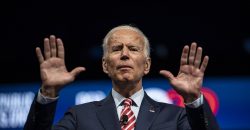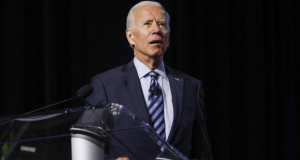Politico: Inside the mission to blow up the 2020 Democratic field
Opposition research books are already being assembled. Political detectives are scouring archives, public records, real-time video and decades of old footage. America Rising PAC, which at the time of its founding five years ago focused exclusively on researching, tracking and deploying rapid-response against Hillary Clinton, is well into a beneath-the-radar effort to define — and ultimately […]
July 30, 2018Opposition research books are already being assembled. Political detectives are scouring archives, public records, real-time video and decades of old footage.
America Rising PAC, which at the time of its founding five years ago focused exclusively on researching, tracking and deploying rapid-response against Hillary Clinton, is well into a beneath-the-radar effort to define — and ultimately derail — the Democrats preparing to take on President Donald Trump in 2020.
The oppo-research carpet-bombing has commenced against Sens. Kamala Harris and Elizabeth Warren, among others: America Rising was responsible for spotting and blasting out a video of Warren telling an audience she wants to “cut open” the bodies of Republicans to see if they have hearts, generating a spate of 2017 stories.
With a potentially colossal field of Democratic presidential contenders and no one close to being a front-runner, the mission figures to be an expensive endeavor. So donors across the country are quietly getting the hard sell as the group moves toward its goal of raising $8 million for the 2020 cycle — roughly three times as much as it took in during the successful three-year quest to help defeat Clinton.
“They are sitting back and building up their ammunition stockpile,” said Ryan Williams, a Republican strategist not involved in the effort, adding that Rising has proven to be among the best at “exploiting a candidate’s weaknesses.”
The spoiler effort, now underway in tandem with the pro-Trump America First super PAC — which helps promote the president’s agenda — is geared toward more than muddying-up prospective Trump opponents. The groups are also pursuing a strategy intended to pit Democrats against each other in a battle of progressive bona fides that the PAC is gleefully branding as the “#RaceToTheLeft.”
The idea is to Identify and create fissures among Democratic candidates, fueling a race to embrace liberal litmus tests like single-payer health care, and stoke emerging flashpoints such as rejecting corporate PAC contributions, legalizing marijuana and abolishing the federal government’s Immigration and Customs Enforcement agency.
“They can’t really coalesce around any message or leader without alienating a significant element of their base or their donors,” America Rising Executive Director Alex Smith, who is leading the 2020 initiative, told POLITICO.
Trump allies see only upside in framing the president’s detractors as unabashed liberals operating far outside mainstream America.
“When you look at the battlefield for 2020, it doesn’t run through liberal America. They are going to win California. They are going to win New York,” Brian O. Walsh of America First said of the Democrats. “These battles are fought in Midwestern, Great Lake states. That’s where, as they gravitate to the left, they are creating more and more opportunities for Republicans.”
Many of the opportunities begin at America Rising, which traces its roots to a co-founder’s apartment and now occupies the fifth floor of an office building in downtown Rosslyn, Va., just outside Washington. With two years still to go until the convention that crowns the Democratic presidential nominee, the number of employees has grown to 75, including 25 full-time candidate trackers.
Together, the team has already filed more than 300 Freedom of Information requests on potential 2020 candidates and monitored more than 700 livestreamed events. On a recent afternoon, dozens of researchers crouched over scattered desks, piecing together research “books” on each of the Democratic prospects.
“If TV is the flashy side, and if digital is the sexy side,” Walsh said of the oppo research dark arts, “I would argue that research is kind of the lurid side.”
Inside the group’s war room — which it staffs seven days a week — a group of 20- and 30-something men were seated at desks, staring at a bank of televisions tuned to C-SPAN and cable news, and uploading clips to a shared, searchable console.
The platform is designed to provide instant access to all of the war room alerts, including print, social media, TV, radio, tracking reports, event livestreams and video transcripts, an aide explained. All of the content can quickly be filtered and sorted by date, type and subject matter, given the large volumes.
That’s proving necessary given the massive field that may take on Trump, including Democratic Sens. Bernie Sanders, Kirsten Gillibrand, Cory Booker, Warren and Harris.
In addition to them, Rising is monitoring and digging into the backgrounds of Gov. Andrew Cuomo of New York, Gov. John Hickenlooper of Colorado and former Gov. Deval Patrick of Massachusetts, along with former Vice President Joe Biden and former Attorney General Eric Holder.
The PAC also is scrutinizing several business executives whose names occasionally surface as possible White House aspirants: Howard Schultz of Starbucks, Bob Iger of The Walt Disney Co., Jamie Dimon of JPMorgan Chase, Tim Cook of Apple, entrepreneur Mark Cuban and liberal activist and former hedge fund billionaire Tom Steyer.
But leading prospects like Harris, Sanders and Warren are getting the most attention up front.
Rising was first to obtain a book Warren authored before its publish date, sharing excerpts to reporters of her taking on other Democrats, and helped analyze data that led to stories painting her as hypocritical because the gender pay gap in her office was wider than the national average.
One of those reports, by the Washington Free Beacon, went on to note that Cuomo, the second major Rising target, paid women less than men after signing two executive orders that year to diminish the wage gap. A subsequent fact check of the Warren report said the analysis excluded relevant data and didn’t include necessary criteria. But the damage was already done.
Earlier this year, Rising captured via livestream Harris saying “it depends” when asked by an audience member at a town hall whether she would reject donations by a corporation or corporate lobbyist — a position Harris reversed herself on a few weeks later, when the California senator declared she would no longer take contributions from corporate PACs.
Rising also pushed out video of Sanders telling a Washington Post reporter that it was “absolutely” a mistake for DNC Chairman Tom Perez to endorse Cuomo, who is facing a primary challenge from actor Cynthia Nixon, stoking an intraparty rift with ripples far beyond the 2018 New York governor’s race.
Embedded in the group’s pitch to donors is the promise that their work product can be rapidly pumped into the national bloodstream to shape the narrative of a candidate before they can adequately define themselves.
As one example, they point to their work defining Clinton, who began preparing to run in the aftermath of Barack Obama’s victory over Mitt Romney in 2012 — a win that many attributed in part to a more robust opposition research infrastructure on the left than the right.
Around the time Clinton released her 2014 book, “Hard Choices,” ahead of her second presidential bid, Rising seized on a now-infamous Clinton answer to Diane Sawyer when she was asked about the millions she earned making speeches. “We came out of the White House not only dead broke, but in debt,” Clinton said.
Rising, within moments, blasted out detailed information about the Clintons’ wealth, including their ownership of several homes, to contradict her claim.
The paid speeches, and Clinton’s excuse, became a frequent Sanders critique. And Trump would go on to accuse her of being “owned” by Wall Street banks.
During its Clinton-focused period, Rising submitted dozens of FOIA requests for State Department records, along with requesting her schedule during Clinton Global Initiative gatherings in New York, among copious other document-collection efforts.
Rising also played an early role is fanning the Clinton email controversy. In March 2015, as details trickled out, she told reporters at the United Nations that “it would’ve been better for me to use two separate phones and two email accounts.”
Rising, within moments of the statement, sent out a clip of Clinton speaking a few weeks earlier at a conference in Silicon Valley where she told the audience, at least at the time, that she used both an iPhone and BlackBerry.
“They put points on the board early against Hillary Clinton in a way that traditional parties couldn’t,” Williams said.
It was in these gotcha moments that the outfit saw some of its most effective and immediate results. One Rising-inspired headline in the Daily Mail, which made its way to Fox News and CNN, read: “Video Shows Hillary Clinton Boarding Private Jet Just Hours After Launching Global-Warming Push.”
Against the backdrop of a $1 billion presidential campaign, the research-heavy PAC’s ability to produce content that chews through news cycles is an attractive proposition for donors looking for a high return on investment.
“Having an outside group like Rising, which has resources all over the country, they are going to generate a lot of fresh content,” said Alex Conant, a Republican strategist not involved in the initiative.
The 2016 campaign demonstrated just how early candidates are defined in the media, said Conant, who served as communications director for the Marco Rubio campaign. Outlets on the left like American Bridge dropped reams of hits on the Rubio campaign, just as it was trying to find its footing in a wide-open field of senators and governors.
“The Democrats were able to slow down Marco at a critical time,” added Conant, with the benefit ultimately redounding to Trump. “It didn’t work out so well for Democrats [and Clinton], but the lesson there is it is going to be very important that Republicans are actively engaging early on.”
Some Republicans point to Trump’s unexpected victory as hard evidence of why those involved in 2020 planning need to be equally primed for any of the Democrats who might emerge as a surprise contender.
“The most challenging thing you have for 2020 is who is going to be the last man standing on their side of the aisle,” Walsh said. “You don’t want to get started on a candidate day the nomination is locked.”
…
Original article can be found here.
Keep tabs on the Democrats. Sign up for news.
Keep tabs on the Democrats. Sign up for news.






